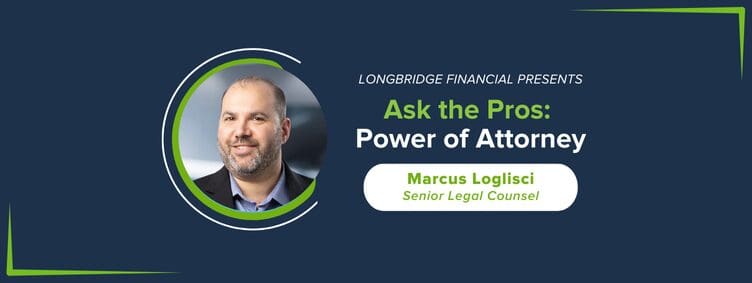Curious about reverse mortgages? You’re not alone—and you’re in the right place.
Welcome to Ask the Pros, our blog series that brings valuable insights straight from our team here at Longbridge Financial. If you’re thinking about tapping into your home equity or just starting to explore the world of reverse mortgages, this series is designed to help you make smart, confident decisions about your financial future.
From demystifying common misconceptions to explaining the fine print, we’re here to offer straightforward, helpful answers to the questions that matter most. Think of this as your personal guide to navigating home equity in retirement. So, whether you’re a homeowner weighing your options, a financial advisor seeking clarity, or you’re simply looking to better understand how reverse mortgages work, you’ll find valuable takeaways in every post.
In our next edition of Ask the Pros, Marcus Loglisci—Senior Legal Counsel at Longbridge Financial—breaks down what you need to know about power of attorney and how it can factor into the reverse mortgage process. (This blog is for informational purposes only and should not be construed as legal advice. You should consult with your attorney of choice for all legal matters, including powers of attorney.)
Let’s dive into the Q&A!
Q: What is a power of attorney, and can it be used to get a reverse mortgage?
A: Put simply, a power of attorney (POA) is a legal document that allows someone else—referred to as an “agent”—to act on a person’s behalf. It’s often used when you want to plan ahead and authorize a trusted person to make decisions for you if you become unable to do so yourself. Depending on how it’s written, a POA can grant authority for a range of responsibilities, from managing finances to making healthcare decisions. And when properly structured, the short answer is yes, a POA can be used in a reverse mortgage transaction.
Q: How does the reverse mortgage process work when a power of attorney is involved?
A: To be used in a reverse mortgage transaction, a power of attorney must be “durable”—meaning it remains valid even if the person who created it (referred to as the “principal”) becomes incapacitated or can no longer manage their own affairs.
Powers of attorney can be used by borrowers during the reverse mortgage process in a few different ways. A durable POA can come into play in various situations, including for convenience (such as travel or scheduling conflicts), due to physical limitations, or when the borrower is no longer mentally competent to make decisions. In these cases, the agent is authorized to sign loan documents on the borrower’s behalf as their “attorney-in-fact.”
However, if the borrower is mentally incompetent, the POA must have been created and executed before the diagnosis of incompetency. If no POA is in place before that point, a friend or family member may need to go through the courts to have a guardian appointed in order to proceed.
Lenders and loan guidelines may also require supporting documentation—like a physician’s letter—to confirm the circumstances, need for, and validity of the POA. In some instances, the agent may be required to participate in reverse mortgage counseling as well.
In addition, when a POA is used in a reverse mortgage transaction, the document must be reviewed and approved by both the lender and the title company. In many cases, it will also be recorded in the public record alongside the reverse mortgage’s security instrument(s).
Q: If someone has power of attorney, are they responsible for the reverse mortgage—and can they access the loan funds?
A: No—if an agent is signing reverse mortgage documents under a power of attorney, they are not personally responsible for repaying the loan. They’re simply acting on the borrower’s behalf and the borrower retains all responsibility for the loan obligations. That said, the agent does have a legal duty to act in the best interests of the borrower.
With regard to an agent’s ability to access loan funds, it is possible in some cases depending on the type of authority granted to the agent. An agent can have the authority to sign and conduct transactions on the borrower’s behalf, including potentially accessing money and account information. That’s why it is absolutely crucial that the person named as POA is someone the borrower fully trusts.
Thank you, Marcus, for sharing your knowledge and expertise with us!
If you’re interested in learning more about reverse mortgages or want to find out if you qualify, contact our team today. Our reverse mortgage consultants will get to know you and your financial situation to help you determine whether a reverse mortgage is the right fit for you. Empower your financial journey—reach out to Longbridge Financial now to make informed decisions about unlocking the power of your home.
